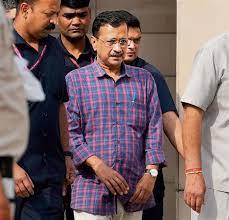
In a dramatic courtroom exchange at the Delhi High Court today, senior advocate Abhishek Singhvi fiercely criticized the Central Bureau of Investigation (CBI) for what he termed an unjust arrest of Delhi Chief Minister Arvind Kejriwal in connection with the alleged liquor policy scam. Kejriwal’s bail plea is currently under consideration before Justice Neena Bansal Krishna.
Singhvi, arguing for Kejriwal, emphasized that the CBI’s actions lacked substantiated grounds and violated fundamental rights, particularly the right to liberty. He likened Kejriwal’s situation to recent controversial arrests in Pakistan, highlighting what he termed as “insurance arrests” to prevent Kejriwal’s release.
The legal battle stems from Kejriwal’s arrest by the CBI, which Singhvi characterized as a move without sufficient evidence or justification. Referring to Kejriwal’s previous bails and releases, Singhvi urged the court to consider the sequence of events leading up to his current detention, asserting that Kejriwal had complied with all legal processes.
The arrest in question occurred shortly after Kejriwal had been granted bail by another agency, the Enforcement Directorate (ED), in a separate case related to money laundering allegations tied to Delhi’s 2021-22 liquor policy. Singhvi argued that Kejriwal’s continued detention was unjustified, given the legal precedents and the absence of concrete reasons for re-arrest.
The Delhi High Court’s proceedings have drawn attention to the broader implications of law enforcement actions and their impact on public figures. Singhvi’s arguments underscored the contention that Kejriwal’s arrest may have been politically motivated, echoing concerns about fair treatment under the law.
The case has sparked a debate on procedural fairness and the boundaries of legal scrutiny in high-profile investigations. As the hearing continues, stakeholders await the court’s decision on whether Kejriwal will be granted interim bail amid ongoing legal challenges.
Kejriwal’s arrest has drawn criticism from various quarters, with supporters arguing that it raises questions about due process and judicial independence. The case remains fluid as legal arguments unfold, shaping perceptions about accountability and transparency in law enforcement practices.
The outcome of today’s hearing could have significant ramifications for Kejriwal’s political future and the public’s trust in India’s justice system. As legal proceedings progress, stakeholders continue to monitor developments closely, anticipating potential shifts in judicial interpretations and law enforcement practices.
Sources By Agencies




